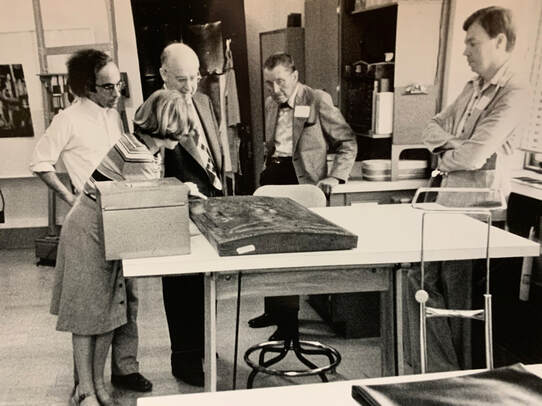The Balboa Art Conservation Center (BACC) provides art conservation and cultural preservation services for cultural institutions and the general public.
The San Diego-based nonprofit is one of only eight regional nonprofit art conservation organizations in the country and the only one in the western region. Founded in 1975, BACC provides art conservation and cultural preservation services, focusing on the care of works of art, cultural objects, and historic artifacts, technical imaging, and analysis while also providing educational opportunities for emerging conservators.
The San Diego-based nonprofit is one of only eight regional nonprofit art conservation organizations in the country and the only one in the western region. Founded in 1975, BACC provides art conservation and cultural preservation services, focusing on the care of works of art, cultural objects, and historic artifacts, technical imaging, and analysis while also providing educational opportunities for emerging conservators.
Mission & Values
The Balboa Art Conservation Center advances the study and preservation of cultural heritage for all communities.
BACC is committed to upholding our key values:
INCLUSION in our knowledge
QUALITY in our practice
ACCESSIBILITY in our service
GENEROSITY in our partnerships
REPRESENTATION in our workplace
BOLDNESS in our vision
OUR STORY
 The first director of BACC, Richard Buck (third from left) and a pioneer in the field of art conservation, George Stout (second from left) with colleagues at BACC, 1973.
The first director of BACC, Richard Buck (third from left) and a pioneer in the field of art conservation, George Stout (second from left) with colleagues at BACC, 1973.
Balboa Art Conservation Center was established in 1975 in San Diego’s Balboa Park on the ancestral and current homelands of the Kumeyaay Nation. It was founded as part of a national movement to establish regional conservation centers, which were designed to bring relief to collecting institutions (museums, libraries, etc.) by fulfilling their conservation needs without requiring them to replicate the administrative, equipment, staffing and resources needed to run a conservation lab. This movement coincided with the rise of conservation as an established profession. Boasting a strong commitment to the preservation of our nation’s cultural heritage from its inception, BACC itself, was founded in part by George Stout, a member of the Monuments Men (the one played by George Clooney in the movie), who also founded the nation’s first conservation laboratory at Harvard’s Fogg Art Museum.
Since its founding BACC has provided conservation services to collecting institutions and private individuals, focusing on the care of paintings and works on paper. In addition to conservation treatment, BACC conservators have continuously provided technical imaging and analysis services, as well as education opportunities for emerging conservators at all levels of their training. This work, however, has historically remained exclusive to established collectors and museums and inaccessible to the diverse communities and collections of BACC’s service area, which includes California, Arizona, Nevada, Utah, New Mexico, Hawaii, Oregon, Washington, Colorado and Alaska. The field of art conservation as a whole has historically focused on the preservation of fine art collections in established institutions, marginalizing the varied material culture and voices not represented within those collections.
In response to this, BACC has begun a radical and transformative shift, acknowledging that as the only nonprofit regional conservation center in the western region, we have a responsibility to provide access to culturally relevant conservation education and services to all communities in our service area, particularly those historically underserved by the field and underrepresented in museum collections. We are committed to shifting the way regional conservation centers engage with collections and communities. Putting this vision into practice, we have undertaken various inclusive conservation programs and broadened the role of a regional conservation center by supporting training and education opportunities, partnering with stewards of community cultural collections, expanding our conservation knowledge base to include culturally conscious and responsive methods of care, and learning from and dialoguing with artists and caretakers of diverse cultural heritage and ancestral collections.
BACC’s transformation into an equitable and accessible institution is ongoing. We are proud to have been founded as an acknowledgement that cultural heritage preservation services are necessary and are working to ensure that those services are accessible to all.
Since its founding BACC has provided conservation services to collecting institutions and private individuals, focusing on the care of paintings and works on paper. In addition to conservation treatment, BACC conservators have continuously provided technical imaging and analysis services, as well as education opportunities for emerging conservators at all levels of their training. This work, however, has historically remained exclusive to established collectors and museums and inaccessible to the diverse communities and collections of BACC’s service area, which includes California, Arizona, Nevada, Utah, New Mexico, Hawaii, Oregon, Washington, Colorado and Alaska. The field of art conservation as a whole has historically focused on the preservation of fine art collections in established institutions, marginalizing the varied material culture and voices not represented within those collections.
In response to this, BACC has begun a radical and transformative shift, acknowledging that as the only nonprofit regional conservation center in the western region, we have a responsibility to provide access to culturally relevant conservation education and services to all communities in our service area, particularly those historically underserved by the field and underrepresented in museum collections. We are committed to shifting the way regional conservation centers engage with collections and communities. Putting this vision into practice, we have undertaken various inclusive conservation programs and broadened the role of a regional conservation center by supporting training and education opportunities, partnering with stewards of community cultural collections, expanding our conservation knowledge base to include culturally conscious and responsive methods of care, and learning from and dialoguing with artists and caretakers of diverse cultural heritage and ancestral collections.
BACC’s transformation into an equitable and accessible institution is ongoing. We are proud to have been founded as an acknowledgement that cultural heritage preservation services are necessary and are working to ensure that those services are accessible to all.
